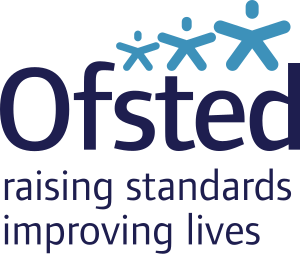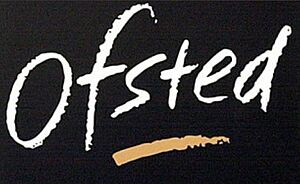Ofsted facts for kids
The Office for Standards in Education, Children's Services and Skills (Ofsted) is a special part of the UK government. It works to make sure that schools, colleges, and childcare services in England are doing a great job. Ofsted checks if these places are providing high-quality education and care for children and young people.
Ofsted inspects many different places, including state schools, some private schools, nurseries, and even places that train teachers. They also check on adoption and fostering agencies. The main goal is to help these services improve and to give parents and the government information about how well they are doing.
The head of Ofsted is called His Majesty's Chief Inspector (HMCI). Sir Martyn Oliver has been the HMCI since January 2024. Ofsted regularly publishes reports about the quality of education and management in schools and other organisations.
Contents
What Ofsted Does
Ofsted's main job is to inspect and regulate services that educate and care for children and young people in England. This includes:
- Childminding and child day care
- Children's centres
- Children's social care
- State schools and some private schools
- Teacher training providers
- Colleges and other learning providers
Ofsted inspectors give advice to the United Kingdom government and Parliament about education in England. They also publish a yearly report on the quality of education across the country. Ofsted has offices in several cities across England, like London, Manchester, and Bristol.
It's important to know that Ofsted only covers England. Other parts of the UK have their own similar organisations, such as Education Scotland and Estyn in Wales.
A Look at Ofsted's History
Inspections of schools in England started a long time ago, in 1837. At first, inspectors checked how well schools were using money given by Parliament. These early inspectors were chosen carefully to make sure they were fair and independent.
Over time, the inspection system grew. More schools were inspected, and local authorities also started doing their own checks. However, the government wanted a more consistent way to inspect schools across the whole country.
In 1992, the Office for Standards in Education (Ofsted) was created. Its job was to oversee inspections of every state-funded school in England. Ofsted started publishing its reports so that schools, parents, and the government could all see the findings. This was a big change, as reports used to only go to the government.
In 2001, Ofsted also became responsible for checking day care and childminding services. Then, in 2007, Ofsted merged with other inspection bodies. This meant it started inspecting all government-funded education for people over 16 (like colleges) and also took on checking social care services for children.
Who Are the Inspectors?
Ofsted employs special inspectors called His Majesty's Inspectors (HMI). These inspectors are appointed by the King. All HMIs who inspect schools have experience working as teachers.
In the past, Ofsted used different types of inspectors, including some who were not from education backgrounds. However, since 2015, Ofsted has taken more direct control over its inspectors. Many of the inspectors today are headteachers or school leaders themselves.
When an inspection happens, an HMI might join an Ofsted inspector. Reports are carefully checked and approved by HMIs before they are published.
How School Inspections Work
Ofsted regularly inspects schools to check the quality of education and how the school is managed. They want to make sure schools are helping students learn and grow. Inspectors visit schools and gather information to decide how well the school is doing.
Ofsted aims to improve lives by raising standards in education and children's social care. They tell schools what they are doing well and what they need to improve. The inspection reports are important for parents, students, and employers, helping them make informed choices about education and care.
Before 2005, schools knew about inspections months in advance. But then, a new system started where schools received only a couple of days' notice. This encouraged schools to always be ready and aware of their strengths and areas for improvement.
Grading Schools
After an inspection, Ofsted publishes a report online. Schools are given a grade for different areas and an overall grade on a 4-point scale:
- 1 (Outstanding): The school is doing exceptionally well.
- 2 (Good): The school is doing well.
- 3 (Requires Improvement): The school needs to get better.
- 4 (Inadequate): The school is not meeting standards and needs a lot of help.
Schools that are rated Outstanding or Good might not be inspected again for several years. Schools that need to improve or are inadequate are inspected more often.
Types of Inspections
There are two main types of inspections:
- Section 5 Inspection: This is a 'full report' inspection. It's a detailed check of the school's overall performance.
- Section 8 Inspection: This is usually a 'monitoring visit'. It's used to check on schools that need to improve, or to gather information for the government. Sometimes, a Section 8 inspection can turn into a full Section 5 inspection if serious concerns are found.
What Inspectors Look For
When inspectors visit a school, they look at several key areas:
- Quality of education: How well students are learning and what they are being taught.
- Behaviour and attitudes: How students behave and their approach to learning.
- Personal development: How the school helps students grow as individuals.
- Leadership and management: How well the school is led and managed.
Inspectors also check how well the school keeps students safe.
Special Measures
If a school is judged as 'inadequate' (Grade 4) and inspectors believe it can't improve without extra help, it might be placed into special measures. This means the school gets intensive support and is checked more often by Ofsted until it improves. Sometimes, the school's leaders or governing body might be changed to help it get back on track.
Concerns About Ofsted
Over the years, Ofsted has faced some criticisms. Some people have said that Ofsted's inspections can be very stressful for teachers and school staff. There have been concerns that the inspections focus too much on data and not enough on the unique qualities of each school.
One very sad event that brought a lot of attention to Ofsted was the death of headteacher Ruth Perry in January 2023. Her family said she was very distressed after an Ofsted inspection downgraded her school. This led to many discussions about how inspections are carried out and the pressure they put on school staff.
Following this, an inquest in December 2023 found that the Ofsted inspection "likely contributed" to Ruth Perry's death. The coroner said the inspection "lacked fairness, respect and sensitivity." This has led to calls for Ofsted to review its inspection methods to make them less stressful and more supportive for schools.
Ofsted's Leaders
His Majesty's Chief Inspector
The HMCI is the head of Ofsted.
- January 2024 – present: Sir Martyn Oliver
Chair of Ofsted
Since 2006, Ofsted has also had a board led by a Chair.
- 2020–2025: Christine Ryan
- 2025–present: Christine Gilbert
See also
 | Stephanie Wilson |
 | Charles Bolden |
 | Ronald McNair |
 | Frederick D. Gregory |



